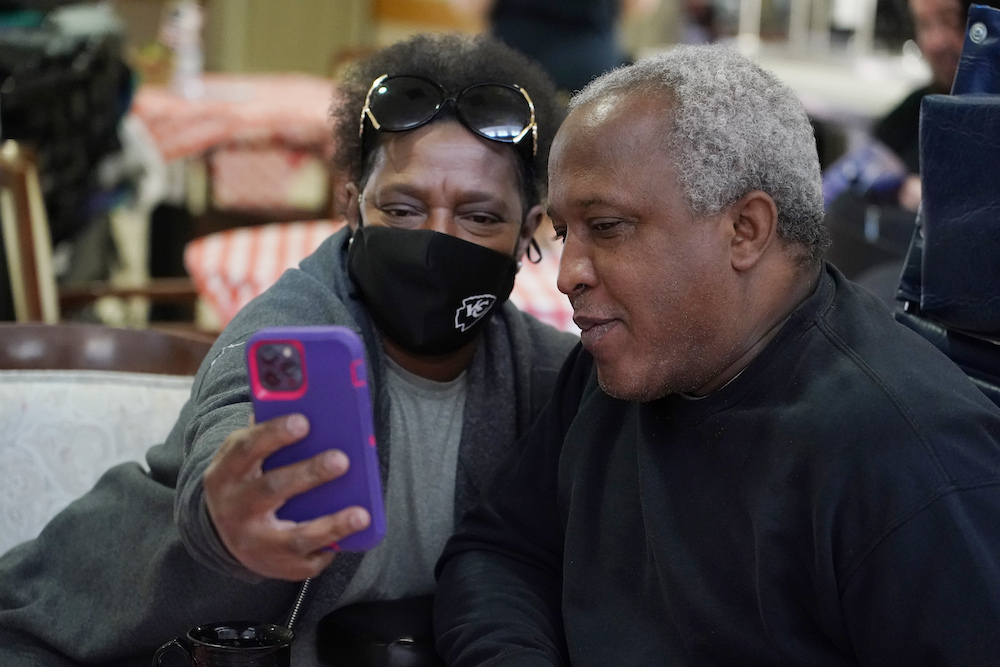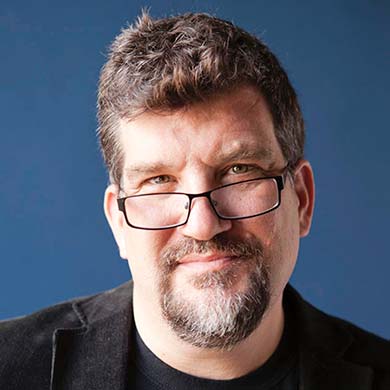
Craig Rawls, an Army National Guardsman, right, poses with his wife Chris Rawls for a "selfie," with only a face mask as a protective garment at the Mississippi State Veterans Home in Collins, Miss., as part of Operation "Family Reunion," on April 1, 2021. Due to the relaxation of protocols designed to slow the spread of coronavirus, the veterans home allowed indoor, in-person visits between veterans and two family members without the use of PPE for the first time since March of 2020
George Floyd was alive the last time my newsroom was open.
Think about that.
So were a half million Americans and three-plus million citizens of the world, now lost to the plague of covid-19.
Donald Trump was president, the news cycle was dominated by his tweets. An insurrection at the U.S. Capitol was unthinkable. Zoom was barely known among the general population. We walked and talked and knocked on doors and flitted in and out of crowds like always, without a care or a vat of hand sanitizer.
We had no idea that in a matter of months we would come to judge friends and strangers, instantly, by whether they shielded their faces or not. And they would judge us.
My newsroom at Alabama Media Group, under the Advance Local umbrella, remains closed to this day and will until it is deemed safe to return. My co-workers hope — or perhaps fear — reopening will come after Labor Day. We hope the virus is contained, that people and communities and states and countries embrace vaccination at the levels required to lead us back to normalcy. We fear it will not be enough for the old, or the sick, or for immunocompromised. Or simply for the unlucky.
Such is the nature of covid.
Frontline workers – doctors and nurses and reporters and grocery store stockers and Uber drivers and on and on and on – have taken on the world all along, from behind their masks. But for those of us who have worked from home for the last 13 months, the opening of newsrooms and classrooms and other places of employment is filled with hope and fear.
I hope the world is ready. I fear it is not.
I hope I am ready. I fear I am not.
I hope my dogs are ready to be alone for a while. I know they are not.
I hope to look a maskless human in the face and see them simply as human. I fear I will drag the baggage of pandemic judgment with me.
I hope to soon knock on a door and be welcomed inside for an interview. I fear my presence will cause anxiety, on both sides of that door, that will make real talk more difficult.
I hope to see friends and co-workers and bosses and sources again. I know – we all know – they will not all be there.
It will be hard to return, whenever that time comes. In the pandemic, we discarded old habits and fell into new ones; new patterns of eating, sleeping, working, exercising, living. We have grown accustomed to reclusiveness, to rolling out of bed for meetings, to calisthenics on the living room rug between Zooms, to apologizing to sources for barking dogs or crying babies or bedhead or bad Wi-Fi.
But returning to a communal world holds a thrill. We need human contact to feel human, and we need to feel human to report the stories of humanity. We need eye contact to fully connect with one another. We need to overhear each other to fuel that serendipity that occurs in newsrooms, when a comment leads to a conversation which leads to questions which lead to stories which lead to understanding.
I hope we learned lessons from the pandemic to take forward. It is easy to see now that emotional health must be a priority in newsrooms as in other workplaces; that in addition to being the right thing to do, it encourages creativity and productivity and endurance and satisfaction.
We know that hybrid work arrangements make sense, that one does not have to always be in an office to be part of the office, that virtual meetings can serve as an often-more-efficient substitute. But we know too that office interactions build teamwork, and trust, and collaboration, and relationships. And those things form the foundation of good work.
I would like to say, as 2020 drags across 2021, that I hope we get back to normal. But the old normal is not the normal we need. Not in journalism, and not in the world.
The world is a very different place. George Floyd is dead, and Derek Chauvin a convicted murderer. We have begun this thing called a “racial reckoning,” but real reckoning has yet to come. It will take work, and commitment, and retaining those things learned – if not from 400 years of history — from a year-plus of tragedy and chaos and change.
It is the same in journalism, as in life. We change, with any hope holding on to the good and discarding the bad. We live and we learn. Or we don’t really live at all.
John Archibald, a 2021 Nieman Fellow, is a Pulitzer Prize winner and columnist for the Alabama Media Group.


